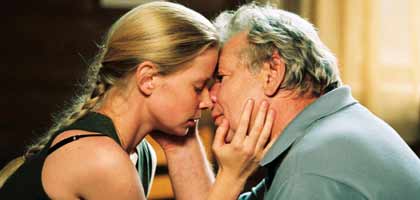
Bergman's last bow
Film of the Month: Saraband

Jonathan Romney assesses, Saraband, the great Ingmar Bergman's commandingly restrained and militantly wintry farewell film.
Three decades after Scenes from a Marriage (1973), Saraband - which Ingmar Bergman has declared will be his final work - stages a rematch between that film's stars, Liv Ullmann and Erland Josephson. The warring, tormented couple, Marianne and Johan, have divorced and started new lives, putting their hostilities and mutual dependencies behind them, but also losing touch with the past: Johan does not even know that one of their daughters now lives in Australia.
Catalysed by Marianne's sudden, instinctive decision to visit Johan, Saraband's drama reunites the couple under seemingly arbitrary circumstances, so a therapeutic ritual can be played out. The sense of ceremony is reinforced by theatrical formality: made on high-definition video for Swedish television, Saraband is shot with matter-of-fact flatness, in a narrow palette of grey-greens and sombre reds, imparting a characteristically claustrophobic severity to Bergman's chamber drama.
Saraband is not a conventional sequel; it deals less with a further stage in the couple's relationship than with unresolved aspects of their lives apart. They are essentially strangers to each other's stories: the drama follows Marianne's discovery of the sorrows in Johan's recent existence. For most of the film she listens, entering Johan's world as confidante, witness and discreet arbitrator. A family lawyer by profession, Marianne effectively plays psychoanalyst to Johan, his widowed son, Henrik, and Henrik's daughter, Karin; but, as often happens in therapeutic narratives, the analyst also experiences a cathartic cure herself.
As Bergman's valedictory, Saraband might be seen as an attempt to resolve all his themes - or at least those pertaining to the drama of conjugality, much as they were restated from Ullmann's perspective in her 2000 Bergman-scripted film Faithless. Saraband's central question is about posterity and legacy: it asks what spouses leave each other after separation, what parents leave their children, what the dead leave the living. The pivotal character is Johan's granddaughter, Karin, struggling to escape the domination of a father whose attachment to her is tyrannical and even incestuous; she and Henrik are seen sharing a bed, and their final scene together contains a brief but intense mouth-to-mouth kiss.
It's hard not to read the film as another of those self-castigating autobiographical dramas in which Bergman demonstrates the selfishness of men - male artists, in particular. Karin is the object of a battle between two controlling patriarchs whose real concern is with each other: claiming to further her musical career, they are violently stifling her talent. Johan is a deeply unsympathetic figure: an embittered ex-husband who tells Marianne that his whole life, including their marriage, has been meaningless; and a bad father who has turned his self-loathing into punitive hostility towards his son, whom he has never forgiven for a youthful rebuke. Henrik is no less monstrous for being a victim: a weak man and a weak artist (like his daughter, he is a cellist), he is insufficiently sustained by his work to handle his wife's death, and vampirically dependent on Karin.
The positive force in all this, virtually presented as a holy spirit, is Henrik's late wife, Anna, whose face gazes enigmatically from her photograph. Her redeeming memory protects Karin, and appears to spur Marianne to resolve her own maternal issues. In a brief coda, Marianne visits her mentally ill daughter Martha, making contact with her for what she feels is the first time in her life.
Marianne narrates the story, introducing it in a sequence to camera, displaying her former marriage in a spread of photographs. Visiting Johan, she appears simply to be walking into a drama that is taking its course rather than playing any active role. Yet, as Karin reminds her, Marianne is deeply involved. One crucial catalysing act she performs is to tell Karin that she has been "the world's most fooled and betrayed wife and lover" - forewarning the girl against her grandfather's manipulative benevolence. It is Karin's departure, precipitating Johan's night of fear, that unblocks the suspended tensions and tendernesses in the old couple's relationship, and which then helps Marianne to confront her own familial blind spot, her relationship with Martha.
Bergman has described Saraband as "a concerto grosso, a concert for full orchestra - only… with four soloists". As in 1978's Autumn Sonata, an earlier story of family estrangement, the title keeps the musical metaphor foremost in our minds. With its use of Bach - only his work allows Henrik to find some glimmer of meaning in life - and Bruckner, whose stormy intensity reflects Johan's internal turbulence, music - as way of life and way of feeling - dominates the film.
Saraband could be described as a series of musical movements, ten duets (bookended by Marianne's solo overture and coda) each with its dominant tone. The opening scene is a gentle pastoral first movement, with Marianne and Johan briefly dropping into the role of fondly reunited couple, a performance that soon proves as false as the perfect-couple routine they played in the opening sequence of Scenes from a Marriage. The second part introduces a note of agitated dynamism as Karin narrates her quarrel with her father in a flashback (one of the few moments in which the film opens out) culminating in her flight into the woods and tormented scream.
Other duets are more mutedly discursive, before yielding violent undercurrents: Henrik's visit to plead with his rejecting father; Karin's meeting with Johan, in which he tries to dominate her with benevolent generosity; and the encounter between Marianne and Henrik, during which the calm austerity of Bach's organ music is undercut by the savage bitterness of Henrik's hostility towards his father. The intensity is cranked up in the emotionally climactic duet between Henrik and Karin, which culminates in their startling kiss.
The final duet begins with Johan experiencing an anxiety attack - "a gigantic, total mental diarrhoea," he says - in a corridor of his house at night, amid heavily angled shafts of darkness (the only scene in which Per Sundin's lighting diverges from functional flatness). It ends with him and Marianne naked, sharing a chaste bed: not a sexual reunion, but a mutual recognition of their fleshly mortality, and a touching, positive conclusion. After all the conflict, physical and emotional closeness can help, at the 11th hour, to ward off the night.
Saraband is a commandingly restrained final composition and - as the theme of classical musicianship suggests - very much an affair of close attention to the nuances of performance. Bergman is still a master of watching people's faces in close-up, especially when they are observing others perform. The compelling agonies of Johan, Henrik and Karin are offset by the sympathetic, critically attentive near-silence of Marianne: as ever, Liv Ullmann is able to convey more complexity of emotion and thought when listening to and watching others than most actors can when in full flight. Erland Josephson gives a masterly impression of blighted, bilious anxiety as Johan, and Börje Ahlstedt brings an almost sympathetic humanity to Henrik, a figure who might otherwise have been too abject to countenance. The film's revelation, however - and no doubt gift to cinematic posterity - is Julia Dufvenius, a passionately energetic player whose presence militates against the film's incipient tendency to fustiness.
It's not unusual for veteran directors to end their careers with intimate minor-key statements, which are often marked by near-minimalist formal austerity. Saraband very nearly fits this category, except that we're used to calling such farewell films 'autumnal'. It comes as no surprise that Bergman's is militantly wintry.
